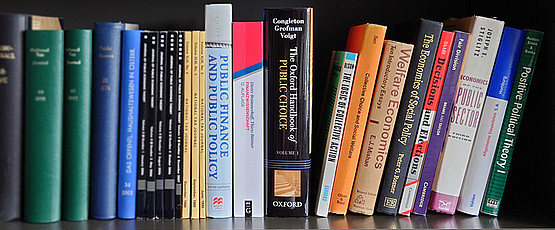Research
Research at the Institute of Public Economics focusses on two main research areas: The key motivation of the first research area is to derive optimal public policy for the current and future economic challenges such as the economic transformation via Artificial Intelligence or the quest for sustainable and inclusive prosperity. This area also includes classical public finance questions of optimal taxation. The second research area focusses on the design of political institutions for the highest level of well-being in societies and how fair collective decisions can be reached in pluralistic and increasingly polarized societies. Methodologically, research at the Institute of Public Economics mainly designs and analyses theoretical models, which are complemented with empirical analyses or numerical simulations where appropriate.
Research area 1: Design of optimal public policy
One central research project in this area focuses on the design of public policy to capitalise on the growth potential of the rapid technological transformation towards Artificial Intelligence while at the same time ensuring large parts of society will stand to benefit. This includes research questions on the societal welfare impacts of much debated public policies such as a robot tax or universal basic income in the context of rapid technological transformations. See Paper “Public Policy Responses to AI” or the paper “Taxation, Innovation and Entrepreneurship” focussing on the optimal and politically viable mix of taxation and public investments in science.
Notwithstanding the effectiveness of more traditional approaches to optimal public policy, our focus also extends to new insights drawn from behavioral economic theory. Specifically, we consider the compelling empirical evidence regarding people's pursuit of status and the phenomenon of hyperbolic discounting, and how these factors influence the efficiency of the economy, income inequality, and the design of an optimal tax system. For further reference, see: “Positional Preferences and Efficiency in a Dynamic Economy” and “Dynamic Status Effects, Savings, and Income Inequality.” Additionally, we delve into the question of whether we should subsidize charitable donations (more) and explore how the optimal tax treatment of charitable giving intersects with optimal income taxation. See also the paper “Optimal Redistributive Charity” and “Charity, Status, and Optimal Taxation: Welfarist and Non-Welfarist Approaches”.
Research area 2: Political institutions and collective decisions in pluralistic societies
Part of this research comprises a project focusing on the impact of political institutions on public policy. In particular, we are interested in the role of institutions for the incentives to self-select to become a politician and how these incentives depend on individual characteristics like gender or diverse backgrounds. This includes research questions on how such incentives to enter politics affects the quality of pollical elites and policy outcomes. See e.g. “Honesty and Self-Selection into Cheap Talk”.
Another part of this research is concerned with the theoretical analysis of voting rules and their application to empirical data from regional elections. This includes the investigation of the empirical relevance of various theoretical results from Social Choice Theory and the practical complexity of voting rules. See “Does the Rule Matter? A comparison of preference elicitation methods and voting rules based on data from an Austrian regional parliamentary election in 2019” or “Evaluative Voting or Classical Voting Rules: Does it make a difference? Empirical evidence for consensus among voting rules”.
One focus is also on axiomatic and algorithmic approaches of collective decision theory. In particular, we are dealing with normative issues such as the fair division of indivisible items or the ranking of sets of objects. See “Using the Borda Rule for Rankings Sets of Objects” or “Two-Person Fair Division of Indivisible Items: Bentham vs. Rawls on Envy.”


